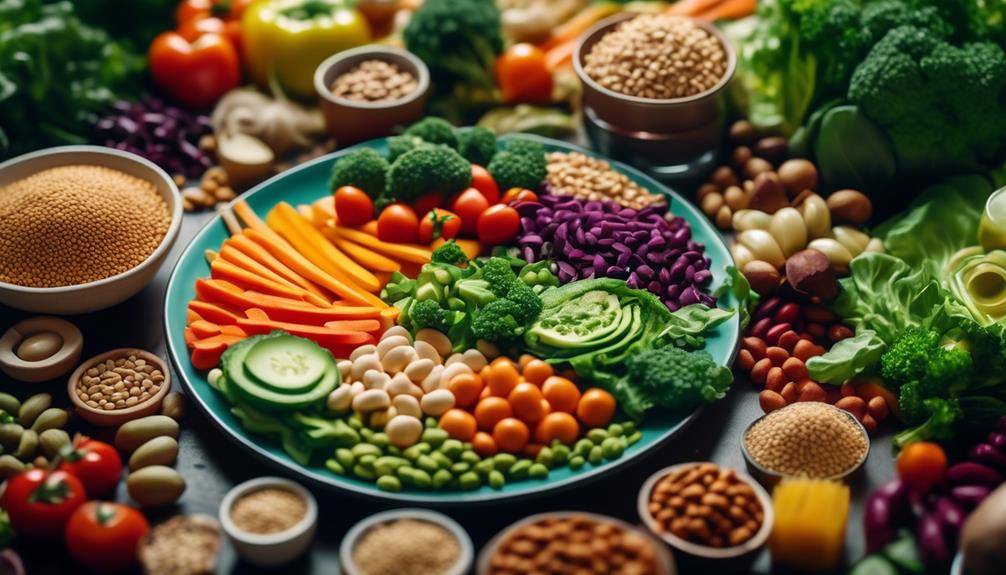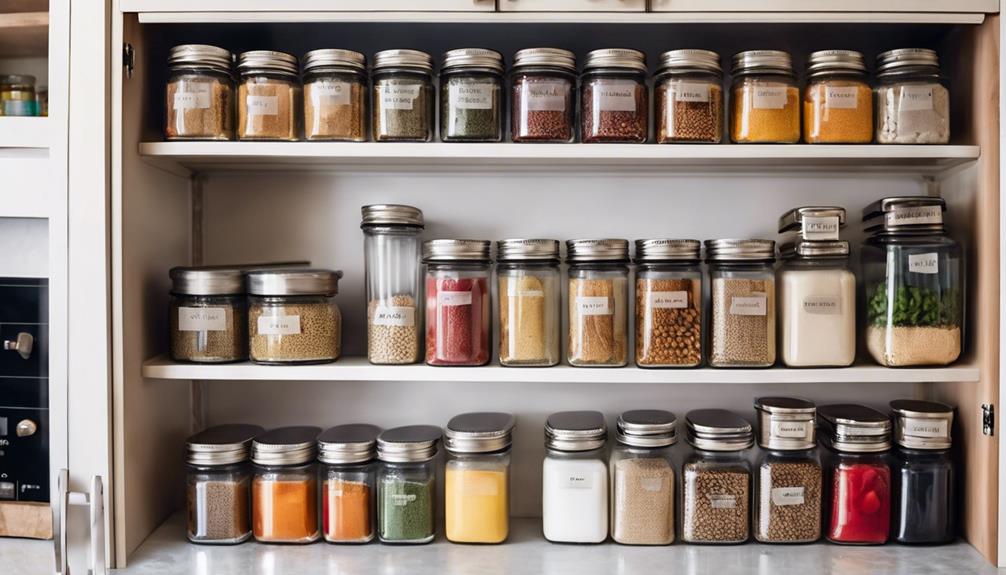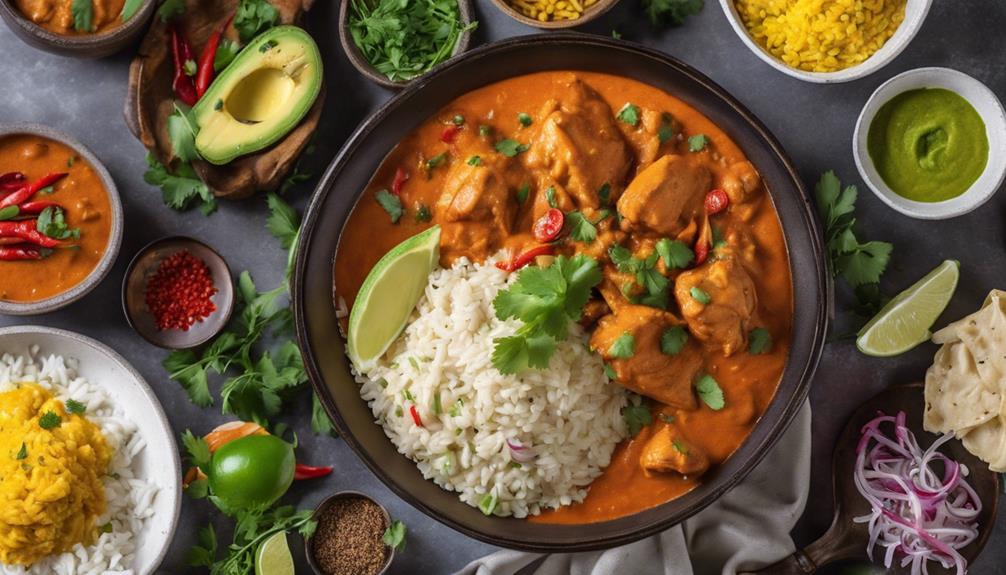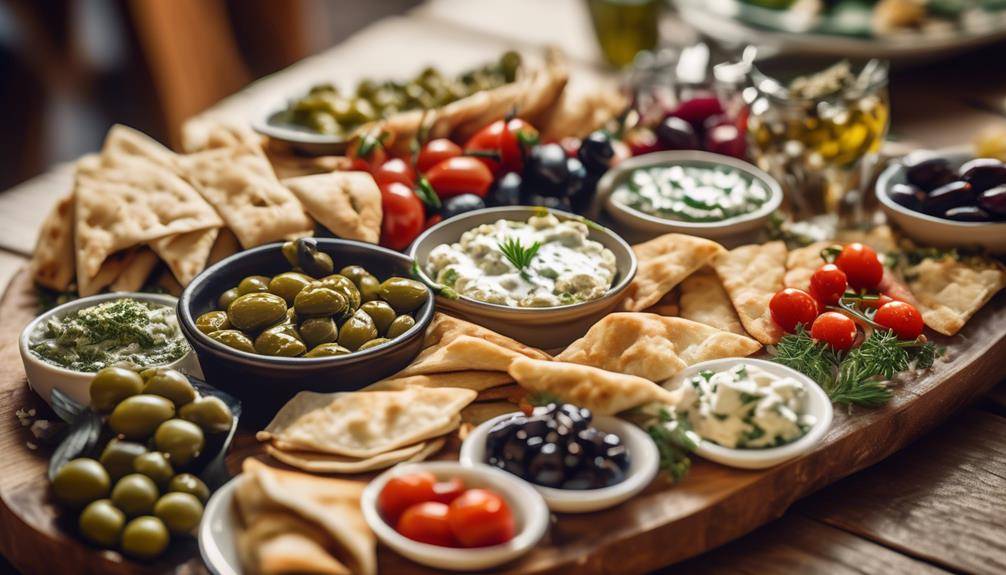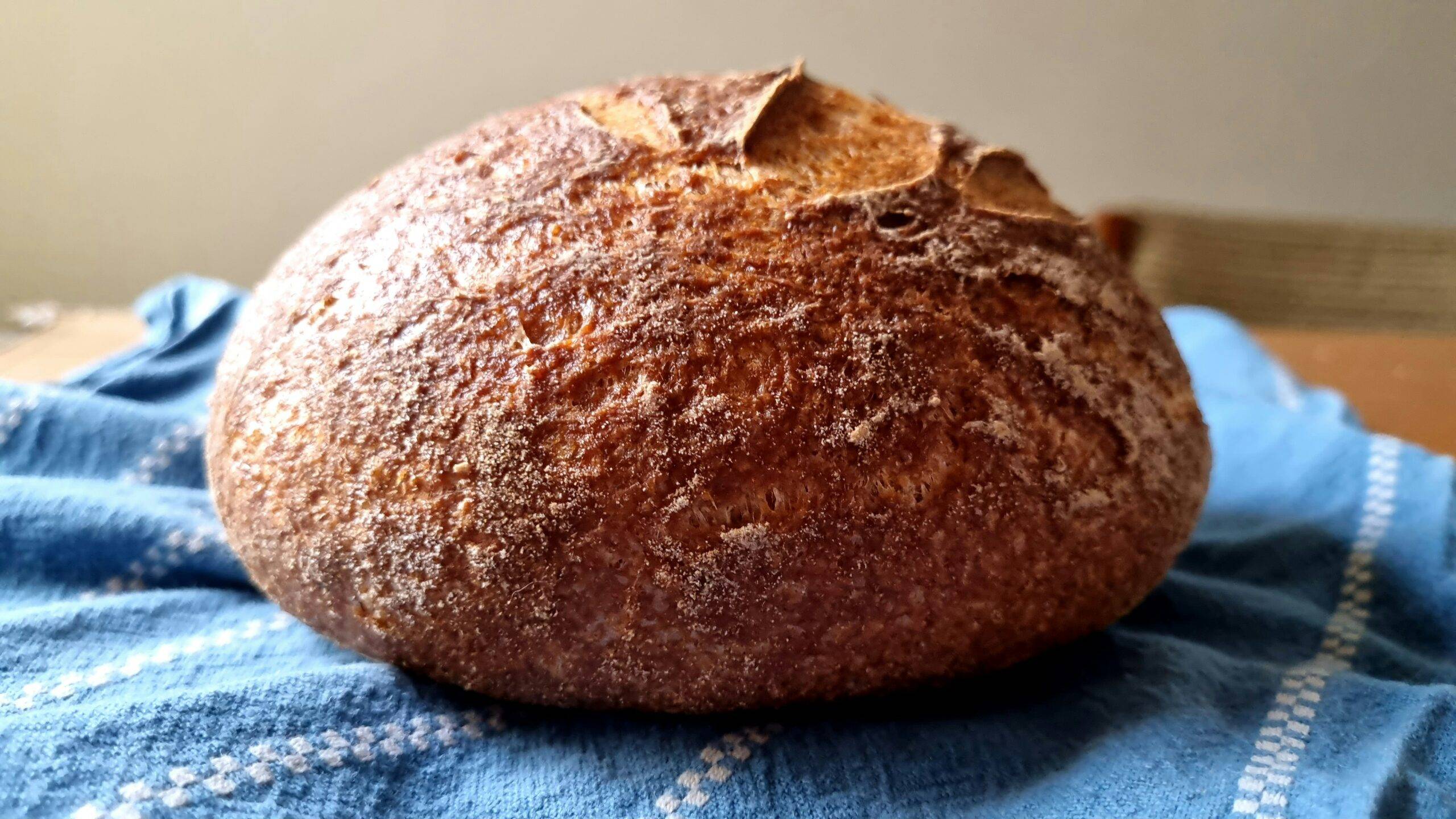Popular Moroccan Breakfast Recipes And Traditions
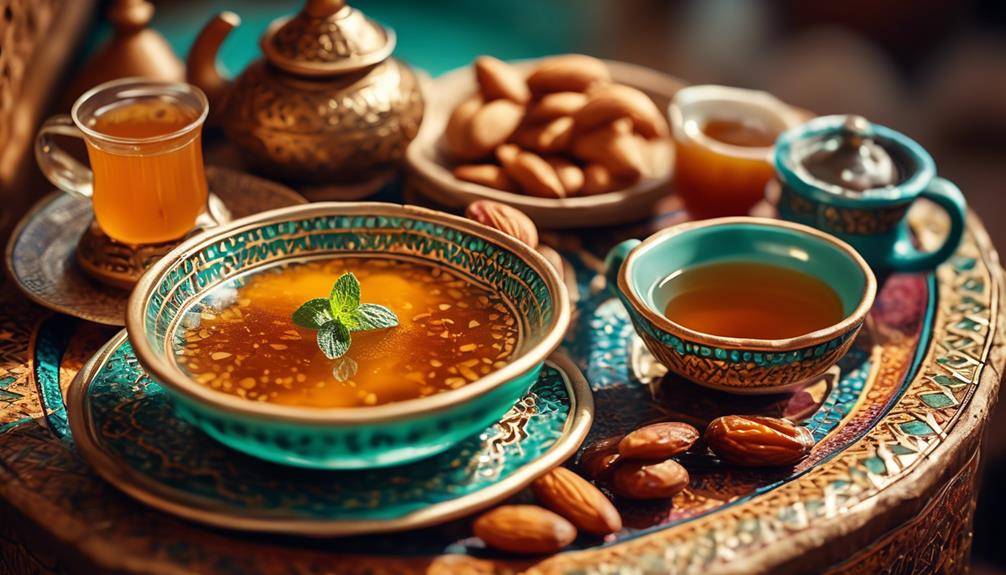
Step into the world of Moroccan Breakfast Recipes, where the art of starting your day off right is elevated to a whole new level. Discover the subtle delights of this vibrant cuisine, as you immerse yourself in the rich traditions and flavorful recipes that make Moroccan breakfasts truly unforgettable. From aromatic mint tea to an array of delectable breads and pastries, the Moroccan breakfast experience is one that will leave your taste buds craving for more. But that’s not all – there are fascinating rituals and etiquettes to explore, as well as the health benefits of the ingredients used. So, buckle up and prepare to embark on a culinary journey like no other.
Introduction to Moroccan Breakfast Cuisine
If you’re curious about the unique flavors and traditions of Moroccan breakfast cuisine, get ready to embark on a delightful culinary journey that will awaken your taste buds and introduce you to a rich tapestry of flavors and aromas. Moroccan breakfast traditions are deeply rooted in the country’s vibrant culture and history. Breakfast in Morocco is considered a sacred meal, where families gather to start their day with delicious and nourishing dishes.
One of the most popular Moroccan breakfast dishes is msemen. These square-shaped pancakes are made from semolina flour, which gives them a slightly nutty flavor and a soft, flaky texture. Msemen is often served with honey, butter, or amlou, a traditional Moroccan spread made from almonds, argan oil, and honey. The combination of the crispy msemen and the sweet, creamy toppings is simply divine.
Another beloved Moroccan breakfast dish is bissara. This hearty soup is made from dried fava beans, which are cooked until they are soft and creamy. Bissara is seasoned with garlic, cumin, and olive oil, giving it a rich and earthy flavor. It is usually served with a drizzle of olive oil and a sprinkle of cumin on top, along with some crusty bread for dipping.
Lastly, a staple of Moroccan breakfast is Moroccan mint tea. This refreshing and aromatic tea is made from green tea leaves, fresh mint leaves, and sugar. It is traditionally served in small, decorative glasses and poured from a height to create a frothy layer on top. The combination of the sweet, fragrant mint and the bitter green tea is a perfect way to start your day.
The Importance of Breakfast in Moroccan Culture
Breakfast holds a special place in Moroccan culture, serving as more than just a meal to start the day. It is a time for families to come together, share stories, and connect before embarking on their daily activities. Traditional breakfast dishes like msemen, beghrir, and harcha are not only delicious but also reflect the rich culinary heritage of the country. This meal is accompanied by rituals and customs that further emphasize the importance of breakfast in Moroccan culture.
Cultural Significance of Breakfast
In the vibrant culture of Morocco, the morning meal holds a deep-rooted significance, shaping the rhythm of daily life and fostering a sense of community and connection.
- Traditional breakfasts are a reflection of cultural practices, with each region having its own unique breakfast traditions.
- Breakfast is a time for family and friends to come together and share a meal, strengthening bonds and creating a sense of belonging.
- The importance placed on breakfast extends beyond the meal itself, as it is seen as an opportunity to start the day with energy and nourishment, setting the tone for the rest of the day.
Breakfast in Morocco is not just about satisfying hunger; it is a cultural experience. The rituals and traditions associated with breakfast reflect the values of community, togetherness, and hospitality that are deeply ingrained in Moroccan society. Whether it’s the warm and comforting taste of mint tea, the aroma of freshly baked bread, or the colorful spread of olives, cheese, and honey, breakfast in Morocco is a celebration of flavors, customs, and connections.
Traditional Breakfast Dishes
As we explore the traditional breakfast dishes of Morocco, we delve into the rich tapestry of flavors and cultural significance that make this morning meal an integral part of Moroccan society. Moroccan breakfast traditions are rooted in the country’s diverse culinary heritage, combining influences from Arab, Berber, and Mediterranean cuisines. Traditional breakfast recipes showcase a variety of ingredients, including bread, olives, cheese, honey, and mint tea.
One popular dish is Msemen, a flaky and layered pancake that is often served with honey or jam. Another staple is Bissara, a flavorful split pea soup that is commonly enjoyed for breakfast. Shakshuka, a dish of eggs poached in a spicy tomato sauce, is also a beloved morning option. These traditional breakfast dishes not only nourish the body but also reflect the warmth and hospitality of Moroccan culture.
Breakfast Rituals and Customs
Immerse yourself in the vibrant traditions and customs of Moroccan culture by delving into the significance of breakfast in this captivating North African country. Breakfast in Morocco is not just a meal; it is a cherished ritual that reflects the rich cultural heritage of the Moroccan people. Here are three fascinating aspects of Moroccan breakfast traditions:
- Time-honored customs: Breakfast is considered the most important meal of the day in Moroccan culture. Families gather around the table to enjoy a leisurely breakfast together, often taking their time to savor the flavors and connect with one another.
- Diverse culinary delights: Moroccan breakfasts are a feast for the senses. From traditional Moroccan breads like baghrir and msemen, to sweet and savory pastries, every dish is infused with fragrant spices and fresh ingredients, creating a symphony of flavors.
- Community and hospitality: In Morocco, breakfast is not just about nourishment; it is a social affair. Inviting guests over for breakfast is a common practice, showcasing the warm and welcoming nature of Moroccan hospitality.
Traditional Moroccan Breakfast Staples
Start your day with a delightful array of flavors and aromas by exploring the traditional Moroccan breakfast staples. These staples form the foundation of a Moroccan breakfast and are deeply rooted in the country’s rich culinary history and cultural significance.
One traditional Moroccan breakfast staple is msemen, a flaky and buttery square-shaped pancake. It is typically served with honey, butter, or amlou, a delicious mixture of almond butter, argan oil, and honey. Msemen is a popular choice for breakfast and is enjoyed by many Moroccans for its simplicity and satisfying taste.
Another staple is harcha, a semolina-based bread that is cooked on a griddle. Harcha can be enjoyed plain or topped with cheese, honey, or jam. It is a versatile option that can be customized to suit your taste preferences.
Bread, or khobz, is also an essential part of a Moroccan breakfast. It is commonly served with a variety of spreads such as olive oil, butter, and honey. The bread is often used to scoop up other dishes or as a base for sandwiches.
Shakshuka, a dish made with eggs poached in a spicy tomato sauce, is another popular Moroccan breakfast staple. It is bursting with flavors and is often enjoyed with a side of crusty bread.
These traditional Moroccan breakfast staples not only provide a delicious start to the day but also reflect the country’s unique culinary heritage. They highlight the importance of fresh ingredients, bold flavors, and communal dining experiences in Moroccan culture. So, why not indulge in these mouthwatering dishes and experience the true essence of a Moroccan breakfast?
Aromatic Moroccan Mint Tea
Get ready to indulge in the delightful aroma and refreshing taste of Moroccan mint tea! This traditional beverage is prepared with a meticulous process that involves steeping fresh mint leaves in boiling water, then adding green tea and sugar. Not only does it awaken your senses with its invigorating scent, but it also offers numerous health benefits, such as aiding digestion and boosting immunity. So, sit back, relax, and savor the soothing flavors of Moroccan mint tea.
Traditional Tea Preparation
To experience the tantalizing flavors and intoxicating aroma of Moroccan culture, indulge in the art of preparing aromatic Moroccan mint tea. This traditional tea preparation is an important part of Moroccan breakfast and is often served during traditional tea ceremonies. Here are three fascinating aspects of Moroccan tea brewing techniques:
- Tea Ritual: Moroccan tea ceremonies are a cherished tradition, symbolizing hospitality and friendship. The process involves pouring tea from a height to create a frothy layer and enhance the flavors.
- Mint Infusion: Fresh mint leaves are steeped in boiling water to release their refreshing essence. The combination of green tea and mint creates a delightful blend of flavors that is both soothing and invigorating.
- Sweet Delight: Moroccan mint tea is traditionally sweetened with sugar or honey. The sweetness balances out the strong flavors of the tea and mint, creating a harmonious taste that lingers on your palate.
Health Benefits of Mint Tea
Steeped in tradition and brimming with health benefits, the aromatic Moroccan mint tea is a delightful and invigorating beverage. As part of Moroccan tea culture, mint tea recipes have been passed down through generations, and the refreshing drink is a staple in Moroccan households. Not only does this tea offer a burst of flavor, but it also provides numerous health benefits.
Mint tea is known for its digestive properties, helping to soothe stomach discomfort and aid in digestion. It is also a great source of antioxidants, which can help protect against cell damage and reduce the risk of chronic diseases. Additionally, the menthol present in mint leaves provides a cooling effect, making it a perfect drink for hot summer days. So, the next time you sip on a cup of Moroccan mint tea, not only will you be enjoying its delightful taste, but you’ll also be reaping its many health benefits.
Exploring Moroccan Bread and Pastries
Indulge in the rich flavors and textures of Moroccan bread and pastries, a delightful culinary adventure that will transport you to the vibrant streets of Morocco. The traditional bread and pastries in Moroccan cuisine are not only delicious but also showcase the unique bread making techniques and flavors of the region. Get ready to tantalize your taste buds with these must-try Moroccan treats:
- Khobz: This round, crusty bread is a staple in Moroccan households. Made with a combination of white and whole wheat flour, khobz has a chewy interior and a crunchy crust. It is often enjoyed with savory dishes or used to scoop up tagines and stews.
- Baghrir: Also known as Moroccan pancakes, baghrir is a spongy and airy treat. These pancakes are made with semolina flour and yeast, giving them a unique texture. They are typically served with honey, butter, or a drizzle of argan oil for a sweet and indulgent breakfast.
- Briouats: These delicate pastries are a perfect blend of sweet and savory. Briouats are made by filling thin sheets of pastry with a mixture of meat, vegetables, or cheese. They are then folded into a triangle shape and fried until golden and crispy. These delightful bites can be enjoyed as an appetizer or a snack.
Exploring Moroccan bread and pastries is a true delight for the senses. The aroma of freshly baked bread fills the air, while the taste and texture of these traditional treats will transport you to the bustling markets and vibrant cafes of Morocco. So, grab a piece of khobz, savor a bite of baghrir, or indulge in a crispy briouat, and experience the flavors of Moroccan cuisine like never before.
Savory Delights: Moroccan Egg Dishes
As you continue your culinary journey through Moroccan cuisine, prepare to savor the delectable flavors of savory Moroccan egg dishes. Moroccan cuisine is renowned for its rich and aromatic flavors, and breakfast is no exception. Eggs are a staple in Moroccan breakfasts, and they are prepared in various ways to create mouthwatering dishes that are both satisfying and full of flavor.
One popular Moroccan egg dish is called Shakshuka. This dish consists of eggs poached in a spicy tomato and pepper sauce, flavored with a blend of fragrant spices such as cumin, paprika, and cayenne pepper. The eggs are gently cooked in the sauce until they reach the perfect level of runniness, and then served with crusty bread for dipping. The combination of the tangy tomato sauce and the creamy yolks of the eggs creates a harmonious explosion of flavors in your mouth.
Another delightful Moroccan egg dish is called Baghrir. These are Moroccan pancakes made with semolina flour and yeast, which give them a unique texture that is both spongy and light. Baghrir pancakes are traditionally served with honey and butter, but they can also be enjoyed with savory toppings such as fried eggs and a drizzle of olive oil. The combination of the fluffy pancakes and the perfectly cooked eggs creates a satisfying and flavorful breakfast that will leave you wanting more.
Moroccan breakfast egg recipes are not only delicious, but they are also a great way to start your day with a protein-packed meal. Whether you choose to indulge in the spicy goodness of Shakshuka or the fluffy goodness of Baghrir pancakes with eggs, these savory delights will surely satisfy your taste buds and leave you craving for more of the flavors of Moroccan cuisine.
Sweet Treats: Moroccan Pancakes and Crepes
Get ready to satisfy your sweet tooth with the delightful flavors of Moroccan pancakes and crepes. These sweet treats are not only delicious but also offer a wide range of variations and filling ideas that will leave you craving for more. Here are three mouthwatering options to tantalize your taste buds:
- Baghrir: These Moroccan pancakes are often referred to as “thousand-hole pancakes” due to their unique texture. Made with semolina flour, yeast, and a touch of orange blossom water, baghrir is fluffy and light. It is traditionally served with melted butter and honey, creating a perfect balance of sweetness.
- Msemen: Msemen is a square-shaped pancake made with a dough that is folded multiple times to create layers. It is cooked until crispy on the outside and soft on the inside. Msemen can be enjoyed plain, but it’s also common to sprinkle it with powdered sugar or drizzle it with honey for an extra touch of sweetness.
- Rghaif: Rghaif is another type of Moroccan pancake that is similar to msemen but thinner and flakier. It can be filled with a variety of ingredients, such as Nutella, almond paste, or sweetened cream cheese. The pancake is then folded and cooked until golden brown, resulting in a deliciously indulgent treat.
When it comes to crepes, the possibilities are endless. Moroccan crepes, known as “m’semen,” can be filled with both sweet and savory fillings. For a sweet option, you can try filling your crepes with fresh fruits, such as bananas and strawberries, and topping them with a drizzle of chocolate sauce or a dollop of whipped cream. If you prefer a savory twist, fill your crepes with a combination of cheese, spinach, and mushrooms for a delightful meal.
Whether you choose to indulge in Moroccan pancakes or crepes, these sweet treats are sure to satisfy your cravings and introduce you to the wonderful flavors of Moroccan cuisine.
Nutritious and Delicious: Moroccan Smoothies and Juices
Get ready to tantalize your taste buds with a burst of fruity goodness! Moroccan smoothies and juices are the perfect way to start your day, packed with an abundance of fresh, vibrant fruits. From classic orange juice to exotic blends like avocado and date smoothies, there is a delightful variety of traditional Moroccan juice recipes to explore. Not only are these breakfast drinks deliciously refreshing, but they also provide a nourishing boost of vitamins, fiber, and antioxidants to kickstart your morning.
Fruit-Packed Breakfast Drinks
Indulge in a refreshing and invigorating start to your day with a variety of fruit-packed breakfast drinks that are both nutritious and delicious – Moroccan smoothies and juices. These vibrant concoctions are bursting with flavors and packed with essential vitamins and minerals. Here are three enticing options to tantalize your taste buds:
- Mango and Passion Fruit Smoothie: This tropical delight combines the sweet and tangy flavors of fresh mango and exotic passion fruit. Blended with a splash of orange juice and a dollop of creamy yogurt, it creates a velvety smooth texture that will transport you to paradise.
- Pomegranate and Raspberry Juice: Quench your thirst with this vibrant ruby-red drink. The tartness of the pomegranate perfectly balances the sweetness of the raspberries, creating a refreshing and antioxidant-rich juice that is as beautiful as it is delicious.
- Watermelon and Mint Cooler: Beat the summer heat with this cool and revitalizing drink. The juicy watermelon is blended with a handful of fresh mint leaves, creating a refreshing and hydrating beverage that will leave you feeling refreshed and rejuvenated.
Start your day off right with these fruit-packed breakfast drinks and let the flavors of Morocco transport you to a land of exotic taste sensations.
Traditional Moroccan Juice Recipes
Quench your thirst for exploration and delight your taste buds with the vibrant and nutritious traditional Moroccan juice recipes. In Moroccan culture, juice holds a significant place, not just as a refreshing beverage, but also as a symbol of hospitality and generosity. Traditional juice recipes are bursting with flavors and are made using an array of fruits, herbs, and spices. One popular juice is “Jus d’Orange à la Menthe,” a refreshing blend of freshly squeezed oranges and fragrant mint leaves.
Another delicious option is “Jus de Pastèque,” a watermelon juice that is perfect for hot summer days. The cultural significance of juice in Morocco goes beyond its taste; it represents the warmth and welcoming nature of Moroccan hospitality. So, sip on these traditional juices and experience the rich flavors and cultural heritage of Morocco.
Health Benefits of Smoothies
Discover the multitude of health benefits that Moroccan smoothies and juices offer, as they combine nutritious ingredients to create delicious and refreshing beverages.
- Boost your immune system: Moroccan smoothies are packed with vitamins and antioxidants that can help strengthen your immune system, keeping you healthy and warding off illnesses.
- Aid in digestion: The fiber content in Moroccan smoothies promotes healthy digestion by supporting regular bowel movements and preventing constipation.
- Provide a natural energy boost: With the right combination of fruits, vegetables, and superfoods, Moroccan smoothies can provide you with a natural and sustained energy boost, making them a perfect choice for breakfast or a midday pick-me-up.
Smoothie recipes in Morocco often include a variety of ingredients such as fresh fruits like oranges and berries, leafy greens like spinach, and traditional Moroccan spices like cinnamon and ginger. The nutritional value of these smoothies is unmatched, as they offer a wide range of vitamins, minerals, and antioxidants that can contribute to overall health and well-being. So, why not start your day with a delicious and nutritious Moroccan smoothie?
Regional Variations in Moroccan Breakfasts
With diverse flavors and ingredients, Moroccan breakfasts vary across different regions of the country. Each region has its own unique culinary traditions and popular dishes that reflect the local tastes and preferences. From the bustling cities of Marrakech and Casablanca to the remote villages of the Atlas Mountains and the coastal towns along the Mediterranean Sea, you can expect to find a wide range of regional variations in Moroccan breakfasts.
In the northern regions of Morocco, such as Tangier and Chefchaouen, you will find a strong Spanish and Mediterranean influence in the breakfast dishes. One popular dish is Baghrir, which are fluffy semolina pancakes served with honey or butter. Another regional specialty is Msemmen, which are thin, flaky pancakes that are often stuffed with cheese or served with a side of olives and preserved meats.
In the central regions, including Fes and Meknes, you can expect to find hearty and flavorful breakfasts. A traditional dish called Bissara is a thick and creamy fava bean soup that is usually served with bread and olive oil. Another popular dish is Khlea, which is a type of preserved meat that is often cooked with eggs and served with bread or couscous.
In the southern regions, such as Ouarzazate and Zagora, breakfasts are often centered around traditional Berber cuisine. A popular dish is Amlou, which is a sweet almond paste made with argan oil and honey. Another regional specialty is Harira, a hearty soup made with lentils, chickpeas, and tomatoes.
No matter which region of Morocco you find yourself in, you can be sure to experience a delicious and diverse breakfast culture. The regional variations in Moroccan breakfasts highlight the rich culinary heritage of the country and offer a unique insight into the local flavors and traditions.
Moroccan Breakfast Rituals and Etiquette
As you sit down to enjoy a delicious Moroccan breakfast, you may be intrigued by the fascinating rituals and etiquette that surround this morning meal. Moroccan breakfast table settings and traditional breakfast ceremonies are an integral part of the Moroccan culture, reflecting the importance of hospitality and communal dining. Here are three interesting aspects of Moroccan breakfast rituals and etiquette:
- Elaborate table settings: When serving a traditional Moroccan breakfast, the table is beautifully set with an array of dishes, including bread, honey, butter, olives, cheese, and various jams. It is common to find a traditional Moroccan tea set, complete with a teapot, glasses, and a tray filled with mint leaves and sugar cubes. The table is often adorned with colorful tablecloths and decorative plates, creating an inviting and festive atmosphere.
- Communal dining: In Moroccan households, breakfast is often seen as a time for family and friends to gather and share a meal together. The breakfast table becomes a hub of conversation and laughter as everyone enjoys the assortment of dishes. It is customary for guests to be served first, showcasing the Moroccan value of hospitality and generosity.
- Traditional breakfast ceremonies: Moroccan breakfasts often begin with a ceremonial washing of hands, known as “Tayammum.” This symbolic act represents purity and prepares individuals for the meal. Additionally, it is customary to break bread together, with each person tearing off a piece and sharing it with others as a sign of unity and friendship.
These rituals and etiquette surrounding Moroccan breakfasts not only enhance the dining experience but also reflect the rich cultural heritage and traditions of the Moroccan people. So, the next time you sit down to enjoy a Moroccan breakfast, take a moment to appreciate the beauty and significance of these rituals.
Health Benefits of Moroccan Breakfast Ingredients
One can’t help but appreciate the numerous health benefits that come from the ingredients used in a traditional Moroccan breakfast. From the rich flavors of spices to the nutritional value of fresh ingredients, a Moroccan breakfast is not only a feast for the taste buds but also a boost for your overall well-being.
One of the key ingredients in a Moroccan breakfast is traditional Moroccan tea, also known as “Maghrebi mint tea.” This tea is made from a blend of green tea leaves, fresh mint leaves, and sugar. Green tea is packed with antioxidants that help reduce the risk of chronic diseases, improve brain function, and aid in weight loss. Mint, on the other hand, aids digestion, relieves stress, and freshens breath. Combined, these ingredients create a refreshing and health-promoting beverage.
Another staple in a Moroccan breakfast is olives. Whether black or green, olives are rich in monounsaturated fats, which are heart-healthy fats that help reduce bad cholesterol levels. They are also a good source of vitamin E, iron, and copper. Eating olives can support a healthy immune system and contribute to the prevention of chronic diseases.
Moroccan breakfasts often include a variety of bread, such as msemen or baghrir. These traditional breads are made with a mixture of flours, including semolina and wheat flour. Semolina is rich in protein, fiber, and B vitamins, which are essential for energy production and brain health. Wheat flour, on the other hand, provides complex carbohydrates that provide sustained energy throughout the day.
Incorporating Moroccan breakfast ingredients into your diet can not only introduce you to a world of delicious flavors but also provide you with a range of health benefits. So, why not start your day with a traditional Moroccan breakfast and reap the rewards of a nourishing and satisfying meal?
Bringing Moroccan Breakfast to Your Home: Recipes and Tips
To bring the flavors and traditions of a Moroccan breakfast to your own home, try these delicious recipes and helpful tips. Moroccan breakfasts are known for their cultural fusion and rich flavors. Here are three recipes that will transport you to the bustling streets of Marrakech:
- Moroccan Mint Tea: Start your day with a steaming cup of Moroccan mint tea. This refreshing beverage is made by steeping green tea leaves with fresh mint leaves and sweetening it with sugar or honey. The combination of fragrant mint and the earthy taste of green tea is sure to awaken your senses.
- Moroccan Pancakes (Baghrir): These light and fluffy pancakes are a staple of Moroccan breakfasts. Made with a mixture of semolina flour and yeast, they have a unique spongy texture. Serve them warm with a drizzle of honey or traditional Moroccan argan oil for a truly authentic experience.
- Shakshuka: This flavorful dish combines eggs cooked in a spicy tomato sauce with a mix of aromatic spices. It is traditionally served with crusty bread for dipping. The combination of the tangy tomatoes, runny eggs, and spices like cumin and paprika create a burst of flavors that will leave you wanting more.
To create a true Moroccan breakfast experience at home, try incorporating some traditional Moroccan elements. Set the table with colorful Moroccan ceramics and serve your breakfast on a large platter, allowing everyone to share and enjoy the communal aspect of the meal. Play some Moroccan music in the background to create an immersive ambiance.
Frequently Asked Questions
What Is the History of Moroccan Breakfast Cuisine?
The history of Moroccan breakfast cuisine is rich and diverse, with influences from various cultures and traditions. It has evolved over time to incorporate a wide range of flavors, ingredients, and cooking techniques.
Are There Any Specific Spices That Are Commonly Used in Moroccan Breakfast Dishes?
In Moroccan breakfast dishes, there are spices commonly used to add flavor and depth. These spices, such as cumin, cinnamon, and ginger, bring a unique taste to the traditional recipes. They can be adjusted to accommodate common dietary restrictions.
What Are Some Traditional Moroccan Breakfast Recipes for People With Dietary Restrictions, Such as Gluten-Free or Vegan?
Looking for gluten-free Moroccan breakfast recipes? Want some vegan options for your morning meal? You’re in luck! There are plenty of traditional Moroccan dishes that cater to dietary restrictions, ensuring a delicious start to your day.
How Does Moroccan Breakfast Differ From Other North African Breakfast Traditions?
Moroccan breakfast differs from other North African traditions in its unique blend of flavors and ingredients. While there may be similarities in some dishes, the specific spices and culinary techniques set Moroccan breakfast apart.
Are There Any Specific Rules or Etiquette That Should Be Followed When Enjoying Moroccan Breakfast?
When enjoying Moroccan breakfast, it’s important to follow specific rules and etiquette. Customs vary, but generally, you should respect the host, eat with your right hand, and try a bit of everything offered.
Conclusion
In conclusion, Moroccan breakfasts offer a delightful and flavorful start to the day. From the aromatic Moroccan mint tea to the diverse range of breads and pastries, these breakfasts showcase the rich culinary heritage of Morocco. The regional variations add an element of excitement and exploration to the experience. Additionally, the breakfast rituals and etiquette add a sense of tradition and community. Incorporating Moroccan breakfast recipes and traditions into your own home can provide a unique and healthy breakfast option that will surely impress.



